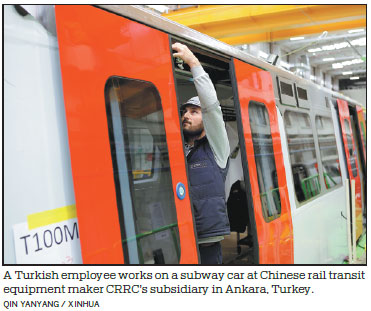Belt and Road partners plan the route ahead
Bolstered by growth, China and Turkey commit to expanding bilateral trade ties
China and Turkey will create more jobs, trade and investment opportunities in the next stage of their partnership boosted by growth of the Belt and Road Initiative, said officials and business leaders.
With a strategic location that straddles Asia and Europe, Turkey boasts fast growth in industrialization, a skilled workforce and diversified commercial ties with Chinese companies.
This will make Turkey a trade hub of the BRI's fast development in the future, said Zhang Yanling, a researcher at the Beijing-based China Association for International Economic Cooperation.
Zhang said the growth was boosted by companies from both countries using their advantages in production and technology collaboration, and tapping commercial potential in services and new energy industries under the framework of the BRI.
Eager to restore his country's developing capacities, a Turkish leader said last week that the BRI is not only an economic initiative. It continues to be an important opportunity for nations that it encompasses to come together, he told reporters at Ankara airport ahead of his departure for the G20 Summit in Osaka, Japan, state-run Anadolu agency reported.
"We see the need to sustain a strong dialogue with China for the stability of the multilateral trade system in this period reshaping, literally, the dynamics of global economy," said the Turkish leader.
Wei Min, a senior fellow at the Chinese Academy of Social Sciences, said both the Chinese and Turkish economies have been hit by declining global demand for goods and services over the past two years. But the degree of interdependence between the two remains stable in bilateral cross-industry trade, he added.
With a population of 80.81 million, Wei said Turkey is a huge market for Chinese-manufactured goods. This can be an important factor to expand bilateral ties.
Turkey could do more to diversify and expand its exports to China and attract investment from high-tech and manufacturing sectors from China, Wei said. The trade volume between China and Turkey amounted to $21.55 billion in 2018. Both countries saw fast business cooperation in fields including infrastructure, energy, service and agricultural development, data from the Ministry of Commerce show.
Cui Wei, the Chinese consul general in Istanbul, added that the bilateral trade volume has hit $100 billion in the past five years since the two countries cooperated under the BRI.
China ships mainly construction machinery, manufacturing equipment, steel, electronics and household appliances to Turkey. In addition to minerals, precious and base metals, chemical and agricultural products, Turkey's exports to China also include plastic rubber, furniture, toys, transport equipment, and materials of textile and garment products.
To further enrich the bilateral trade, China launched a freight train service from Lianyungang in East China's Jiangsu province to Istanbul in November 2018.
The freight train passes through Kazakhstan, Azerbaijan and Georgia, and finally arrives in Istanbul. This has further enhanced the logistical and transport system linking Asia and Europe.
China and Turkey have also been accelerating the development of e-commerce platforms and smart cities, easing import processes, consolidating goods trade and expanding service trade over the past three years.

(China Daily 07/04/2019 page12)














